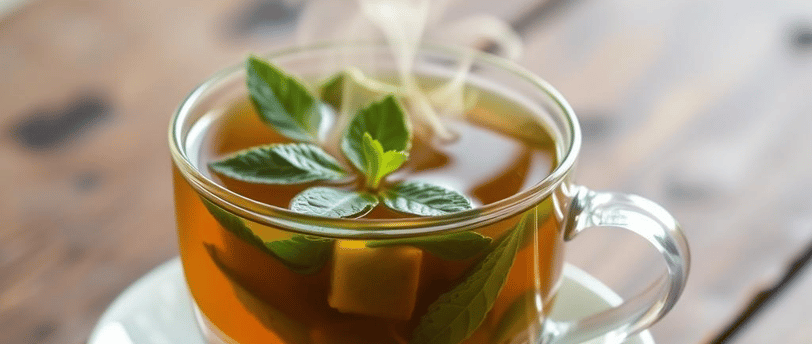Drink Ginger or Peppermint Tea for Digestion – Soothes Bloating and Discomfort
🧘WELLNESS TIPS🌱 GUT HEALTH & DIGESTION


Digestive discomfort, characterized by bloating, gas, and general unease, is a common complaint that many individuals face today. With busy lifestyles and a less-than-ideal diet, digestive health often takes a backseat. Fortunately, nature provides us with a range of remedies, two of the most effective being ginger and peppermint. This article explores the scientific evidence supporting the use of ginger and peppermint tea for enhancing digestion, alleviating bloating, and providing overall comfort.
Understanding Digestive Distress
Before delving into the benefits of these herbal teas, it's essential to understand what causes digestive distress. Factors such as overeating, consuming rich or fatty foods, stress, and underlying health conditions contribute to an upset stomach. Symptoms can vary significantly from mild discomfort to severe pain and bloating, all of which can affect one’s quality of life.
Fortunately, many people find relief in herbal teas, particularly those made from ginger and peppermint. These natural remedies have been used for centuries in various cultures, and recent scientific inquiries have begun to shed light on their effectiveness.
The Healing Power of Ginger
The Science Behind Ginger
Ginger (Zingiber officinale) is not just a culinary staple; it's also a powerhouse of medicinal properties. The primary bioactive compound in ginger is gingerol, which has been shown to have anti-inflammatory and antioxidant effects. A systematic review of randomized controlled trials published in the journal Carcinogenesis found that ginger effectively alleviated various gastrointestinal symptoms, including nausea and bloating (Ernst & Pittler, 2000).
Ginger has been extensively studied for its ability to influence digestion. It stimulates the production of digestive enzymes, enhancing the breakdown of food and promoting smoother digestion. Scientific evidence points to ginger's ability to speed up gastric emptying, which refers to the rate at which food exits the stomach and enters the small intestine, thus reducing feelings of fullness and bloating.
Ginger Tea: A Natural Remedy
Making ginger tea is simple and can be done in a few easy steps. Here's how to prepare a comforting cup:
Peel and slice a 1-2 inch piece of fresh ginger root.
Boil about two cups of water in a pot.
Add the ginger slices to the boiling water and let it simmer for about 10-15 minutes.
Strain the tea and enjoy it hot. For added flavor, you can include honey or lemon.
Research from the National Institutes of Health indicates that ginger tea may help in alleviating symptoms of indigestion. In a study published in the Journal of Gastroenterology and Hepatology, participants who consumed ginger extract reported a significant reduction in symptoms of nausea and bloating (Kirkwood, 2015).
The Soothing Properties of Peppermint
The Science Behind Peppermint
Peppermint (Mentha piperita) is another digestive ally backed by scientific research. Its active ingredient, menthol, is known for its antispasmodic properties, which help relax the muscles of the gastrointestinal tract. A meta-analysis in the Journal of Gastroenterology highlighted peppermint's effectiveness in alleviating symptoms associated with irritable bowel syndrome (IBS), including bloating, abdominal pain, and gas (Kloosterboer, 2015).
The cooling sensation of peppermint provides immediate relief for digestive discomfort. Its ability to enhance bile flow also assists in the digestion of fats, further preventing bloating and gas accumulation in the digestive system.
Peppermint Tea: A Refreshing Escape
Brewing peppermint tea is equally simple and can provide instant relief for digestive unease:
Take a handful of fresh peppermint leaves or use dried leaves.
Boil two cups of water.
Add the peppermint leaves to the boiling water and steep for about 5-10 minutes.
Strain the tea and savor the refreshing taste.
Research published in the American Journal of Gastroenterology found that peppermint oil capsules significantly reduced symptoms in patients with IBS compared to placebo treatments (Bouchoucha, 2014). This emphasizes the potential benefits of peppermint tea, as it contains similar components that can help alleviate digestive discomfort.
Combining Ginger and Peppermint
While both ginger and peppermint have unique benefits, they can also be combined for a more potent effect. The warming properties of ginger can enhance the digestive benefits of peppermint, creating a multidimensional approach to soothing digestive issues. Mixing these two ingredients in a single tea can provide a holistic remedy for bloating and discomfort—using the respective strengths of each herb.
A Simple Ginger-Peppermint Tea Recipe:
Take one inch of fresh ginger and slice it.
Take a handful of fresh peppermint leaves.
Boil two cups of water and add both the ginger and peppermint.
Simmer for 10-15 minutes and strain.
Optional: Add honey or lemon to taste.
Lifestyle Tips for Optimal Digestion
While ginger and peppermint tea are excellent natural remedies, they work best as part of a broader approach to digestive health. Here are a few additional tips to support your digestion:
Stay Hydrated: Drinking adequate water assists digestion and helps prevent bloating.
Mindful Eating: Eating slowly and chewing food thoroughly can prevent indigestion.
Regular Exercise: Physical activity encourages bowel movement and reduces gas.
Manage Stress: Practices like meditation or yoga can significantly impact digestive health.
Final Thoughts
In a world where digestive discomfort is increasingly common, incorporating ginger and peppermint tea into your routine can offer a natural and effective remedy. Scientific evidence supports their roles in alleviating bloating and improving overall digestive health. While these teas provide relief, adopting a healthy lifestyle will enhance their benefits.
Next time you experience bloating or discomfort, consider reaching for a warm cup of ginger or peppermint tea as a soothing, natural solution. Your digestive system will thank you.
